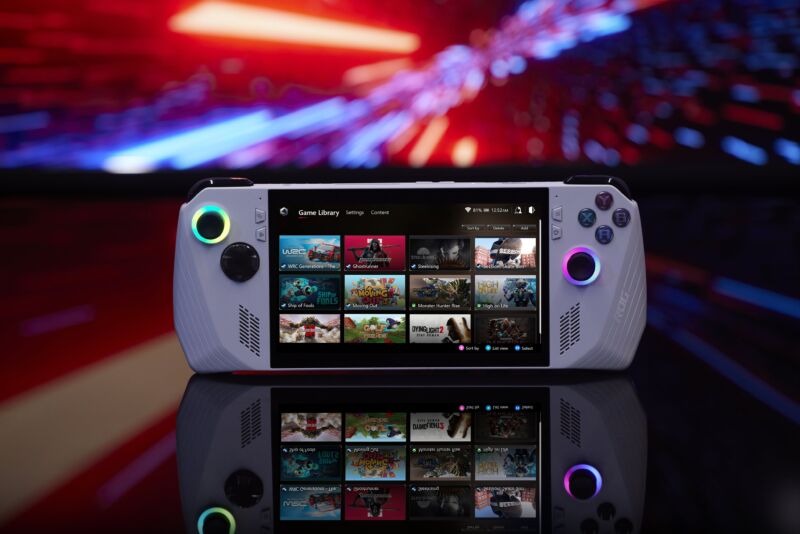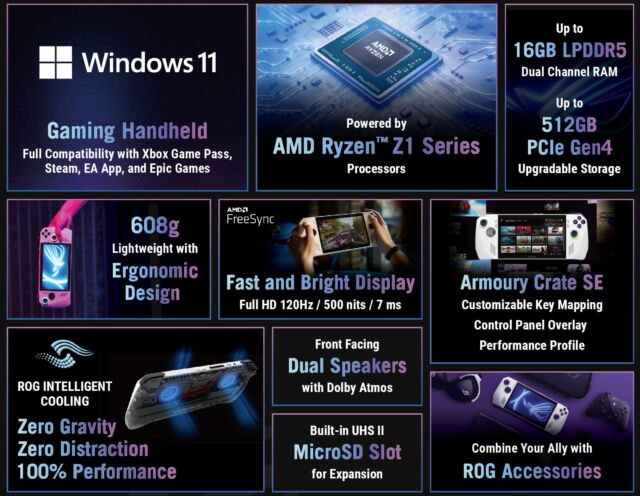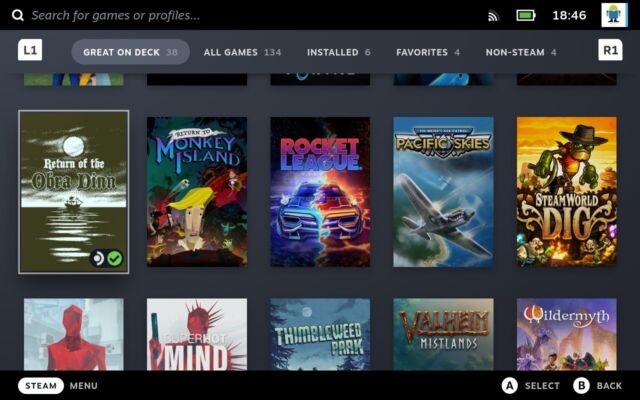This is what growth looks like —
How the Asus ROG Ally and other handheld PCs could make Steam Decks even better.

I held off on buying the Steam Deck after it came out a little more than a year ago. At the time, it had lots of bugs, long shipping delays, and some uncertainty about how much commitment its maker, Valve, really had for its latest hardware experiment. I gave in and bought one about two months ago, and I’ve been enjoying this much-improved device ever since.
But now comes the Asus ROG Ally, which is powered by a new 55 percent faster AMD Ryzen Z1 chip yet costs only $50 more than the highest-end Steam Deck at a purported (store-leaked) $700. It also runs Windows 11 (perhaps in “handheld” mode), making it easier to run many games, including blockbuster AAA titles and massive online titles like Fortnite. The Ally is seemingly a bit flatter and lighter than the Steam Deck, and it has a sharper and brighter screen and a refresh rate of up to 120 Hz. It might even run cooler and quieter, according to brief hands-on experiences posted by reporters. It will seemingly arrive in early May or shortly thereafter.

Enlarge / Nearly every one of these specs shows a notable improvement over the Steam Deck, and yet I, a new Deck owner, remain sanguine.
As you might expect, the gaming press—which, like all press, is fundamentally geared toward conflict—is cheering to see another combatant enter the arena. Asus’ device is “gunning straight for the Steam Deck,” “bad news for Steam Deck,” and “big trouble for the Steam Deck.” It has one writer “ready to ditch my Steam Deck.” The ROG Ally, Giovanni Colantonio writes at Digital Trends, “fixes almost every single problem I have with the Steam Deck.”
Normally, I might feel dismayed at this news. I am predisposed to impulse purchases of weird little computers and deep regret upon considering them in hindsight. And yet seeing that a seemingly much-improved version of my handheld PC would be available just two months after I gave in? I’m OK with it.

Enlarge / Who’s ready for some dead sailors, car soccer, point-and-click adventures, or procedurally generated RPGs?
Kevin Purdy / Valve
Defining what you want from handheld gaming
Consider the Switch. What makes Nintendo’s system great for me is not its graphical prowess, which was already a bit underwhelming at its 2017 launch. For most people, it’s Nintendo’s games, the system’s portability, and its deeply embedded pick-up/put-down nature. Nearly every game can be stopped and resumed at a moment’s notice (a developer friend once told me that implementing this was the toughest part of his game’s Nintendo certification). The Switch was my system for airports, couches, vacations, and other uncertain spans of idle time. The Steam Deck now serves much the same purpose for me, albeit with 150 percent more weight, plus Linux and many more buttons.
If I want to play a game with a truly comfortable controller or keyboard-and-mouse setup at the highest fidelity possible (within my budget), good headphones or surround speakers, and maybe even voice chat, I play it on my gaming PC. Sometimes, that means streaming my PC to my TV and playing it there; you could easily substitute a PlayStation 5 or Xbox Series S/X for this mode. In my early middle age, I don’t lack ways to play games. I lack the ability to play a game for a carefree length of time, at least without ruining my sleep schedule. I lack calendar-appointment gaming. When I can’t get that, I’m happy to get some Steam Deck time, but usually with different games.
The Steam Deck has blurred these lines a bit, sure. There are some games that work as both lean-back couch fare and settle-in experiences. But it’s never without friction. Elden Ring runs weirdly well on the Steam Deck, but playing a game that deep, requiring split-second timing, a lot of menus, and a huge field of view, never feels fully right on the Deck. Playing first-person shooters can be fun, but I usually feel like I’m performing at something like 70 percent capability—and not solely because of the frame rate and controller. That’s even more true for games that require a lot of mouse-pointer action, like John Wick Hex and BattleTech. The Steam Deck’s trackpads (something missing from the ROG Ally) certainly help. But even with them, I feel like I’m playing a demo of what the full game must be like.





